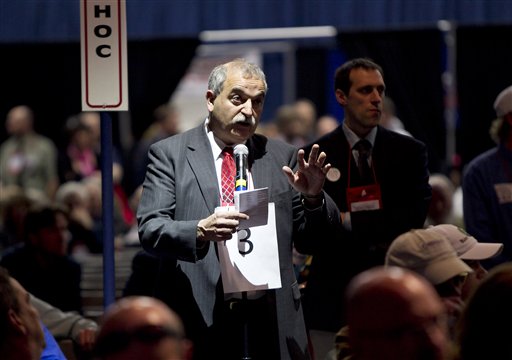PORTLAND — Maine’s tumultuous GOP presidential caucuses that sparked a revolution at the state party convention by angry Ron Paul supporters could provide extra support for a bill that would put Maine on a path to return to presidential primaries in four years.
Senate President Kevin Raye introduced the bill to restore presidential primaries a month after the GOP’s handling of its caucuses generated widespread criticism.
Supporters say primaries encourage greater voter participation compared to caucuses, which are often daylong affairs that tend to appeal to party activists.
“Mainers, on the whole, regardless of the party, are more apt to go to a voting booth than participate in a caucus, which is time consuming and confusing,” said Josh Tardy, a former GOP House leader. “Both parties want to appeal to the regular ordinary voter, not just the activists.”
Opponents tend to focus on the cost, which could reach more than $1 million, compared to caucuses, which are funded through the parties.
Raye’s proposal, which has been scaled back, would require the Veterans and Legal Affairs Committee to draft a proposal to restore primaries to be considered by lawmakers next year.
It awaits final action next week in the Senate.
The nonbinding Republican caucuses last winter were a messy affair with Chairman Charlie Webster on Feb. 11 declaring Mitt Romney to be the winner under the state committee’s rules even though a snowstorm delayed votes in Washington County. Supporters of Paul, the Texas congressman and a presidential longshot, cried foul.
The GOP later acknowledged that numbers from some communities were inadvertently omitted and that the tallies were flip-flopped in Portland.
Romney remained the winner even after figures were adjusted and Washington County held its vote, but angry Paul supporters had the last word when they took over the party’s convention last weekend and stripped Romney of most of his delegates. Paul’s supporters installed their own convention chairman and won 21 out of 24 delegates to the national convention.
Even if Raye’s bill passes, it wouldn’t address what happened at the convention. Parties, after all, make up their own rules for electing delegates to the national convention.
The last presidential primaries were in 2000 — won by future Republican President George W. Bush and then-Vice President Al Gore, a Democrat — and the state paid more than $50,000 to print the ballots, said Megan Sanborn of the secretary of state’s office. A survey by the Maine Municipal Association suggested an expense of about $1 million for municipalities.
For Raye, he said it’s worth the money to boost participation and to ensure an accurate vote count on something as important as a presidential preference poll. After all, the state already holds a separate primary in June for congressional, gubernatorial and legislative races, he said.
Neither of the major parties is taking a position on Raye’s proposal.
Webster, for his part, said he has no interest in repeating the caucus problems that drew unwanted national attention. If he had a do-over, he said, he would recommend against holding a nonbinding vote that in the end had no bearing on apportionment of delegates.
“When it comes to the caucuses, one candidate got a few more votes (than the other) in this beauty contest poll and it didn’t mean anything,” he said.
Send questions/comments to the editors.



Success. Please wait for the page to reload. If the page does not reload within 5 seconds, please refresh the page.
Enter your email and password to access comments.
Hi, to comment on stories you must . This profile is in addition to your subscription and website login.
Already have a commenting profile? .
Invalid username/password.
Please check your email to confirm and complete your registration.
Only subscribers are eligible to post comments. Please subscribe or login first for digital access. Here’s why.
Use the form below to reset your password. When you've submitted your account email, we will send an email with a reset code.